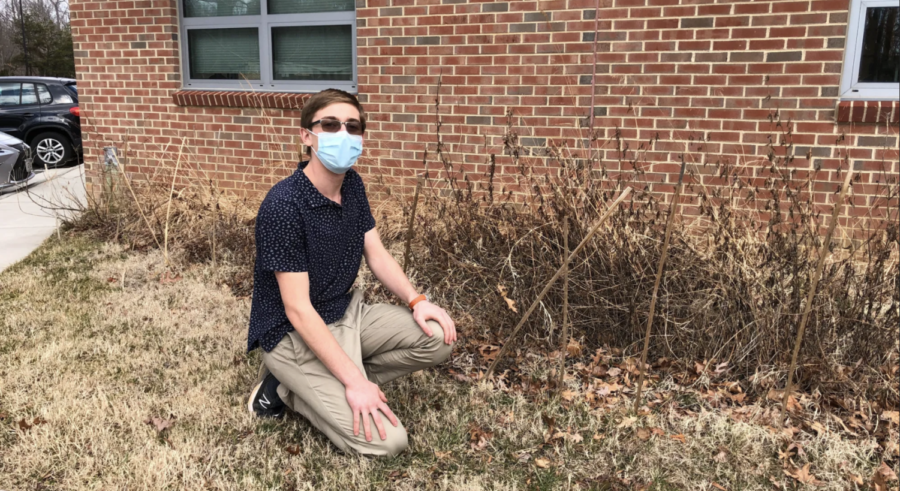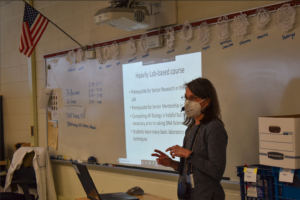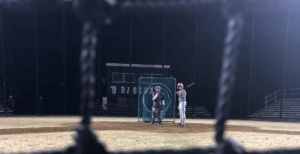An eighth period for environmental protest
Liam Carey kneels in front of a plot of dead plants outside of Jefferson. Carey founded this as a wildflower garden due to his interest in gardening, but these flowers do not survive in the winter. “It’s a bit dead right now, but it’ll grow back in the spring,” Carey said.
February 24, 2022
It’s all been said before, in a variety of ways. According to the U.S. Environmental Protection Agency, CO2 emissions have increased by about 90% since 1970. According to NASA, 2016 and 2020 are tied for the hottest years on record. According to the United Nations, climate change will lead to the weather swinging between extreme events, such as heat waves, heavy precipitation, and droughts. The planet is dying, but what can be done about it?
That’s a question junior Liam Carey pondered over recently. His answer appeared in the TJHSST Facebook group on Jan. 9th, in the form of a poll to gauge interest in a Fridays for Future strike. Fridays for Future is a movement founded by Greta Thunberg that, as the title suggests, calls for student strikes on Fridays to protest climate change. In the poll, Carey called for students to leave school on an undetermined Friday to demonstrate in front of the U.S. Senate. That strike is now planned to take place on Mar. 25th, to be on the same day as a global strike the Fridays for Future organization has called.
“The time is ripe for a climate strike,” Carey wrote. “Our defunct government has failed time and again to produce any meaningful climate policy, and new science is showing that climate change is linked to millions of deaths every year.”
On Facebook, Carey’s profile picture is of him with a tree. That alludes to his love of plants and gardening.
“I’m really into gardening and plants and stuff, so I volunteered at a native plant nursery where we grow native plants to help local wildlife,” Carey said. “I’ve basically redone my yard with native plants, and I founded a wildflower garden at TJ.”
Carey is thus well aware that climate change would lead to a dramatic fall in biodiversity. However, to Carey, the struggle against climate change is a far more fundamental issue.
“My drive to work for climate change is older than my obsession with plants, but it definitely adds urgency,” Carey said.
Instead, Carey points to a multitude of events as motivating him to call for a climate strike. One event he personally saw were wildfires in Minnesota that occurred last summer.
“Last summer, I was in Minnesota and the sky was all gray, it was disgusting,” Carey said.
He also cites events like a tornado that caused severe damage in Western Kentucky last December, which he believes can be linked to climate change, and the government’s inability to respond to these climate change events as climate change.
“[There’s] also the tornadoes in Kentucky, Biden’s just like, ‘Oh, that wasn’t climate change,’ no, that was climate change, that’s not normal,” Carey said.
In doing his own research into climate change, Carey found that the issue seemed far more urgent than the media made people aware of.
“I’ve done quite a lot of research on this and I’ve found that the media tends to downplay climate change quite a bit, the scientific studies I’ve been looking at all make it seem much more urgent than what the media says, so I think even people at TJ don’t really understand the full extent of what’s going on, but almost no one does,” Carey said.
All of these events led Carey to the conclusion that action needed to be taken to get the government to respond to climate change. After deliberating, he decided that one of the best things to do was to call for a student strike.
“I’ve been nervous about the climate and what that means for our future. So I spent time brainstorming what I could do about it and that was one of the things that I thought would be most effective,” Carey said.
On the poll, Carey asked whether students would be interested in striking on an 8th period, from the beginning of lunch, the entire day, or on a weekend.
“I think the ideal would probably be leaving after lunch and skipping 7th and 8th period because that gives a good 2 hours to strike,” Carey said. “It’s not too long, and you’re only missing one period, so I think that would get the most turnout.”
According to the poll, striking during the 8th period is the leading option, while leaving at the beginning of lunch is the second most favored option.
John Yao, the freshman class council president, is interested in striking either on an 8th period or on a weekend, but said he wouldn’t skip his classes.
“I’m the class president, and I don’t want to put on a bad example,” Yao said. “Skipping class time isn’t good, so during an 8th period or during Saturday, it’s all good.”
Carey plans to organize transportation to Washington D.C. using bus routes, as they would be running regardless of the strike. Carey isn’t sure what will happen on the day of the strike, but has a few plans to try to address climate change.
“I was planning to give a speech because I have a speech organizing the strike so I’ve been writing that, and then I was thinking, maybe an open mic for anyone who wants to make a point about climate,” Carey said. “I’ve also made like 5-10 posters already, so we’d hold the posters, and I was thinking of trying to get in touch with a representative from Congress to talk to them, because really what we’re striving for is climate legislation, for the government to do something.”
Yao believes that the strike will be a good opportunity to enjoy time with friends as well.
“I think we’re going to go to D.C. and make some noise. It’ll be a pretty good time, we can get some food from one of those little vendors over there, hanging with my friends,” Yao said. “I might make a sign, but I think they’ll probably hand those out.”
Although Carey is attempting to get in touch with a legislator, he knows that he can’t force anything onto legislators. Rather, he wants to use the strike to raise awareness with people so that they will push for climate legislation.
“Quite honestly, I don’t think this one strike is going to affect legislation because that’s not how our system works anymore, but a success is something that gets more people to think about climate change and what it means,” Carey said. “The more people that are informed and the more people who are pushing for climate legislation, then the more likely it is to happen at a local level or a state level or maybe even a federal level, so we just need to raise awareness and we need more people to be pushing for climate legislation.”
Yao similarly believes that the main point of the strike should be to raise awareness in the government.
“If we’re loud enough and annoying enough that someone tells us to get out of the lawn … then we’ve made our point, right?” Yao said. “I don’t actually expect any action to come from this, but the more politicians that know that this is something people care about, the better.”









